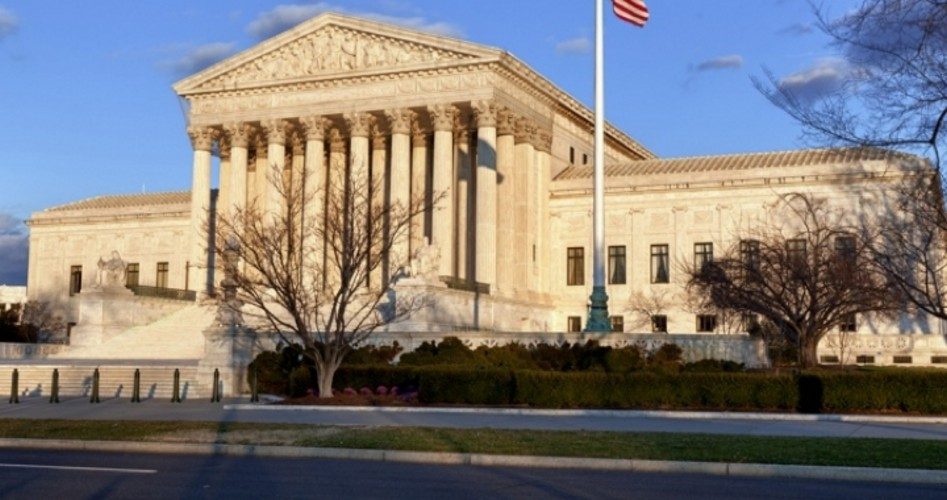
Last week the Supreme Court of the United States heard oral arguments in the case of Arizona v. United States regarding the Grand Canyon State’s anti-illegal immigration statute — SB 1070.
The question before the eight justices (Justice Elena Kagan recused herself from the case because prior to taking her place on the Supreme Court bench she worked for the Solicitor General on the government’s argument against Arizona) is constitutionally very critical. The issue is: “whether the federal immigration laws preclude Arizona’s efforts at cooperative law enforcement and impliedly preempt these four provisions” of SB 1070.
The following are the four key provisions of the law whose constitutionality are in question:
1. A requirement that local police officers check a person’s immigration status while enforcing other laws if “reasonable suspicion” exists that the person is in the United States illegally.
2. A provision authorizing police to arrest immigrants without warrant where “probable cause” exists that they committed any public offense making them removable from the country.
3. A section making it a state crime for “unauthorized immigrants” to fail to carry registration papers and other government identification.
4. A ban on those not authorized for employment in the United States to apply, solicit, or perform work. That would include immigrants standing in a parking lot who “gesture or nod” their willingness to be employed.
Regarding the preemption argument forwarded by the federal government, the attorney representing Arizona, Paul Clement, explained to the Court that in its attack on Arizona’s enactment of SB 1070, the government misunderstood the proper application of “fundamental principles of federalism” Clement stated:
“A State does not need to point to Federal authorization for its enforcement efforts. Rather, the burden is on the parties seeking to preempt a duly enacted State law to point to some provision in statutory law that does the preempting.”
The Solicitor General disagreed:
“It is the national government that has ultimate responsibility to regulate the treatment of aliens while on American soil, because it is the nation as a whole, not any single state, that must respond to the international consequence of such treatment.”
A decision in the matter is expected be handed down by the Supreme Court sometime in June.
Meanwhile, as has been chronicled in The New American, several other states that have passed anti-illegal immigration laws that are obvious progeny of the SB 1070 are anxiously awaiting the ruling, as well.
In March a three-judge panel of the 11th Circuit Court of Appeals in Atlanta told representatives of Alabama and Georgia that they would wait for the Supreme Court’s decision in Arizona v. U.S. before handing down a ruling of their own regarding the Alabama and Georgia statutes that were in large part derivatives of the law passed in Arizona.
In the wake of his argument in favor of ObamaCare, things are going from bad to worse for Solicitor General Verrilli. In the oral arguments, Justices of both ideological pedigrees took issue with Verrilli’s insistence that as enforced SB 1070 unconstitutionally exceeds the federal footprint in the sphere of immigration control.
Not only did the Solicitor General argue that Arizona has no power to exclude illegals from its borders, but he took one step beyond, insisting in his response to a question posed by Justice Sotomayor that the “the Constitution vests exclusive authority over immigration matters with the national government.”
Clement responded that Arizona was forced to enact SB 1070 because the “rampant illegal entries” across its southern border created an “emergency situation.” Besides, he continued, the Arizona statute is not an expression of a radical states’ rights agenda, rather it is a “collaboration” between the state legislature and the federal government.
Curiously, while his argument in favor of Arizona’s right to act in the immigration arena correctly restates the proper relationship between federal and state authority, by invoking the “emergency situation” defense, Clement ironically appears to appeal for an enlargement of the federal government’s constitutional sphere of sovereignty.
That is to say, the lawyer for Arizona says that if the federal government were doing its job (controlling illegal immigration across the border with Mexico) then Arizona would not have been forced to pass its own law that attempts to accomplish that necessary goal.
Since the beginning of the federal government’s case against Arizona’s anti-illegal immigration law (and that of each of the other states who have passed similar bills), the Obama administration has insisted that the federal government has exclusive jurisdiction over immigration and states are preempted from entering that field.
Once the feds have “occupied the field,” so the argument goes, of this or that area of the law or policy, then no other government (state or local) may trespass therein.
In all of the complaints filed against the various states that have enacted Arizona-style immigration laws, U.S. Attorney General Eric Holder insists that the federal footprint has marked the legal limits within which a state may make laws in the field of immigration.
Constitutionalists are hopeful that the Supreme Court’s decision will address the critical question of where, exactly, in the Constitution is found congressional authority to regulate immigration. Article II does place control of naturalization within the federal bailiwick, but naturalization is not synonymous with immigration, despite the decades long attempt by the all three branches of the federal government to conflate the two.
In fact, the enumeration in the Constitution of specific powers delegated to the federal government is the cornerstone of American political theory and of the constitutional Republic established in 1787.
The basic definition of enumerated powers is that the best limitation on power is to not give it in the first place. Powers, as understood by Madison, Jefferson, et al., were only legitimate if they had been granted to the government by the people and written specifically in the document through which the governed gave life to the government — the Constitution.
Notably, the Constitution makes no such endowment of power over immigration to the federal government; therefore, the Tenth Amendment guarantees that the right to rule in that area is reserved to the states and to the people.
Regardless of whether the Supreme Court upholds the principle of federalism and rules in favor of Arizona, the states have a natural right to govern themselves and needn’t be bound by actions of the federal government that exceed the boundaries placed by the Constitution around its very limited sphere of authority. As Alexander Hamilton wrote in the Federalist Papers:
“It may safely be received as an axiom in our political system that the state governments will, in all possible contingencies, afford complete security against invasions of the public liberty by the national authority.”
It need hardly be argued, furthermore, that the encroachment into an area of the law not specifically allotted to it by the Constitution would qualify as such an invasion by the federal government.
While the federalism aspect of the case is the only question before the Court, there are those who would paint the picture with racist overtones. The Chief Justice made it clear from the outset, however, that this issue would not be addressed in the Court’s ultimate ruling.
“Before you get into what the case is about, I’d like to clear up at the outset what it’s not about,” Chief Justice Roberts told the Solicitor General who then was asked by Roberts to assure the Court that the government’s position had nothing “to do with racial or ethnic profiling….”
Finally, Arizona Governor Jan Brewer who signed SB 1070 into law two years ago was present in the Court last Wednesday and she told reporters that she was “very, very encouraged” by the tenor of the questions posed by the Justices to the parties.
If only constitutionalists had cause to be equally encouraged by Arizona’s bold defense before the Supreme Court of the right of all states to govern themselves in all areas not specifically delegated to the federal government.


